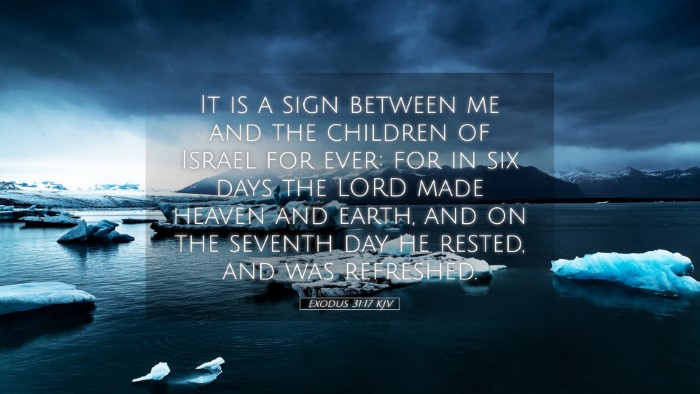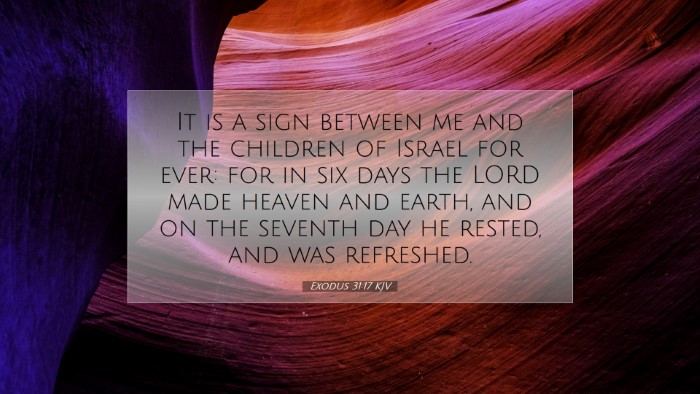Commentary on Exodus 31:17
Verse (Exodus 31:17): "It is a sign between me and the children of Israel forever: for in six days the Lord made heaven and earth, and on the seventh day he rested, and was refreshed."
Introduction
This verse encapsulates the purpose of the Sabbath and highlights the significance of divine rest. It serves as a reminder of God's creative activity and His established covenant with the people of Israel. Engaging with this text allows pastors, students, theologians, and Bible scholars to reshape their understanding of rest, sanctity, and the nature of God’s relationship with creation.
Contextual Analysis
The context of Exodus 31 is critical. It comes at a point where God is addressing Moses about the building of the tabernacle, emphasizing the need for divine rest and human imitation of that rest. Observing the Sabbath is tied to God's work in creation and serves as a covenant mark for Israel.
The Importance of the Sabbath
Matthew Henry comments that the Sabbath is not merely a day of rest but a divine institution, given for the benefit of mankind. This is reflected in the language of “a sign,” indicating its role as a marker of the special relationship between God and Israel.
Creation Reflection
Albert Barnes notes that the reference to the six days of creation serves a dual purpose: reminding Israel of the origins of their worship and hierarchizing their understanding of time and work. The creation narrative imparts theological significance to the rhythm of labor and rest.
Theological Insights
This verse is rich in theological implications concerning the nature of God and humanity. It highlights God as Creator, the establishment of time, and the concept of rest as essential to man's existence. It also reflects the idea that rest is not idleness but refreshment—an active engagement with God’s goodness.
God’s Rest
Adam Clarke elaborates on the phrase "was refreshed" suggesting that God’s rest on the seventh day represents completions and affirmations of a created order. It illustrates that God’s work leads to a state of goodness and satisfaction, demonstrating the importance of rest as a divine model for humanity.
Covenantal Significance
The verse positions the Sabbath as a covenantal sign, a concept noted by Matthew Henry. This function serves not only as a reminder of God’s original creation but also as a perpetual symbol of His covenant with the Israelites, reaffirming their identity and their obligation towards divine worship.
Practical Implications for Believers
Understanding Exodus 31:17 brings forth several practical applications:
- The Value of Rest: In a fast-paced world, believers are reminded of the theological and personal necessity of rest.
- Covenantal Living: The observance of the Sabbath fosters a deeper sense of covenantal identity and a commitment to living in accordance with God’s will.
- Reflective Worship: Like God’s rest after creation, observance of the Sabbath should encourage worship and reflection on His deeds.
Conclusion
Exodus 31:17 serves as a cornerstone of Judeo-Christian belief regarding work, rest, and the significance of God's creative acts. This verse invites deeper reflection on our covenant with God, urging believers to emulate divine rest in their lives. As we study this passage, we understand that it teaches about much more than a day of the week; it outlines an enduring relationship between the Creator and His creation.


